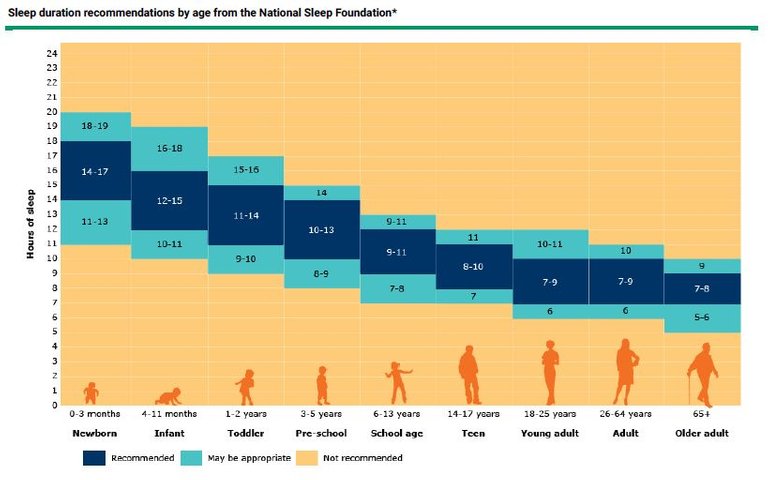
A sufficient amount of sleep is essential for optimal physical health, immune function, mental health, and cognition.
Consensus recommendations of the American Academy of Sleep Medicine and Sleep Research Society specify that adults aged 18 to 60 years should sleep seven or more hours per night on a regular basis for optimal sleep health.
Sleep insufficiency exists when sleep is insufficient to support adequate alertness, performance, and health, either because of reduced total sleep time (decreased quantity) or fragmentation of sleep by brief arousals (decreased quality).
Acute sleep deprivation refers to no sleep or a reduction in the usual total sleep time, usually lasting one or two days.
Chronic sleep insufficiency (also called sleep restriction) exists when an individual routinely sleeps less than the amount required for optimal functioning.
EFFECTS OF ACUTE SLEEP DEPRIVATION
Cognitive effects-Sleep deprived individuals tend to take longer to respond to stimuli. Tasks that rely on higher cognitive functions are also significantly affected.
Mood and judgment- poor mood, irritability, low energy, decreased libido, poor judgment, and other signs of psychologic dysfunction.
Sleepiness and microsleeps- Sleep deprivation results in a powerful drive for sleep that is not always under the control of the individual. This drive allows for sleep to intrude into wakefulness for only a few seconds whenever there is a lack of physical activity, such as driving. Such lapses are referred to as microsleeps.
Alter Respiratory physiology
Cardiovascular morbidity- increases risk of heart related problems including heart attack
Immunosuppression
Obesity
IMPROVING TOTAL SLEEP TIME
Stick to a sleep schedule of the same bedtime and wake up time, even on the weekends.
If you have trouble sleeping at night, avoid naps, especially in the late afternoon. However, short naps lasting approximately 20 minutes can help alleviate daytime fatigue, sleepiness, and even provide cognitive benefit.
Exercise daily.
Sleep on a comfortable mattress and pillows.
Avoid cigarettes, caffeine, and heavy meals in the evening.
Wind down with quiet activities that may promote sleep, such as reading with a dim light. Avoid use of electronics at least 30 minutes before habitual bedtime and in the middle of the night if nocturnal awakenings occur.
If you cannot sleep, do not look at a clock. Go into another room and do something relaxing until you feel drowsy enough to fall asleep again. Then return to bed.


I used to wake up very early in the morning when I go to work, so I also sleep very early at night. That's true, eat less at night because when we sleep our food digestion becomes slow and so the more food you eat at night, the more belly fat you will have :-)
so true